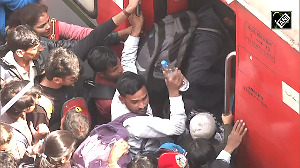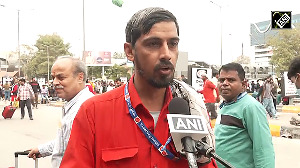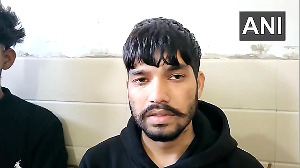On my way to Baramullah, 31 km northwest of Srinagar, yesterday after the quake, nearly every passenger with me in the taxi I took at Lal Chowk in the heart of Srinagar appeared unusually quiet, except for a young businessman, given to dramatics, who kept insisting that 250 houses in his village near Baramullah had collapsed.
Complete Coverage: Terror from the Earth
Others did not say much, preferring to softly mouth prayers or make observations on the power of god. The news from Uri, which was already trickling in at that hour, was making the mood more sombre. Most of my fellow passengers were from that northernmost town on the Line of Control in Baramullah.
The Valley has known nothing but uncertainty, driven by terrorism-related politics, in this past decade and a half. On previous visits to this beautiful vale insecurities arising from the fear of what violent men could do was uppermost on people's minds. This time it was different. The fear of heaven's retribution, an expression heard frequently since Saturday's high-intensity earthquake, was keeping the populace downcast and philosophical. People called it the tsunami of the mountains. And if you recall eight months ago, folks here were referring to February's deluge as a snow-nami.
It is not hard to spot the vivid imagination of the public here in Kashmir, which perhaps stems from being on tenterhooks for years together. In the course of a two-hour jaunt -- made more arduous by numerous road blocks -- through rural Baramullah in the Vaghoora block, every rumour that I had heard on the three-hour drive from Srinagar was repeated.
Mercifully, Baramullah town and its rural areas had not suffered too much damage. But the locals' readiness to believe anything at all was so extraordinary. A persistent rumour, scotched only well after midday, doing the rounds was that a prominent politician had been assassinated. Later, while I was waiting for a car for my return journey to Srinagar, someone confidently recounted that there had been some firing in Srinagar. I was almost sorry to disabuse him of his story. Somehow dwelling on imaginary dramatic happenings appeared to be a diversion from the insecurities of daily life and blurting out the truth was almost not welcome around here.
Uri could not be reached by roads until late in the evening on Sunday. The authorities had closed the road to general traffic. But from all accounts, the situation there was grim, as it was across the LOC in Pakistan Occupied Kashmir.






 © 2025
© 2025